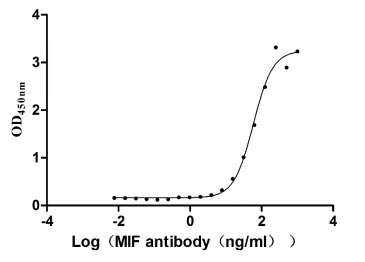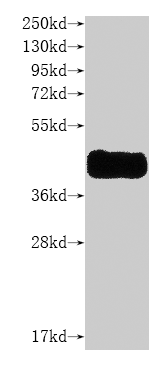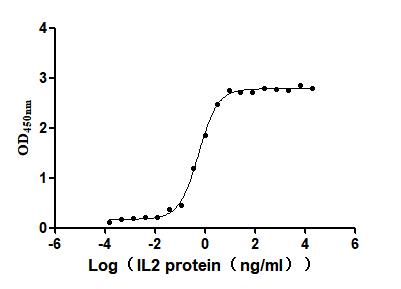Recombinant Drosophila melanogaster Serine/threonine-protein kinase hippo (hpo), partial
-
中文名称:黑腹果蝇hpo重组蛋白
-
货号:CSB-YP819425DLU
-
规格:
-
来源:Yeast
-
其他:
-
中文名称:黑腹果蝇hpo重组蛋白
-
货号:CSB-EP819425DLU
-
规格:
-
来源:E.coli
-
其他:
-
中文名称:黑腹果蝇hpo重组蛋白
-
货号:CSB-EP819425DLU-B
-
规格:
-
来源:E.coli
-
共轭:Avi-tag Biotinylated
E. coli biotin ligase (BirA) is highly specific in covalently attaching biotin to the 15 amino acid AviTag peptide. This recombinant protein was biotinylated in vivo by AviTag-BirA technology, which method is BriA catalyzes amide linkage between the biotin and the specific lysine of the AviTag.
-
其他:
-
中文名称:黑腹果蝇hpo重组蛋白
-
货号:CSB-BP819425DLU
-
规格:
-
来源:Baculovirus
-
其他:
-
中文名称:黑腹果蝇hpo重组蛋白
-
货号:CSB-MP819425DLU
-
规格:
-
来源:Mammalian cell
-
其他:
产品详情
-
纯度:>85% (SDS-PAGE)
-
基因名:hpo
-
Uniprot No.:
-
别名:hpo; CG11228Serine/threonine-protein kinase hippo; EC 2.7.11.1; Drosophila homolog of MST1 and MST2; STE20-like kinase MST; dMST
-
种属:Drosophila melanogaster (Fruit fly)
-
蛋白长度:Partial
-
蛋白标签:Tag type will be determined during the manufacturing process.
The tag type will be determined during production process. If you have specified tag type, please tell us and we will develop the specified tag preferentially. -
产品提供形式:Lyophilized powder
Note: We will preferentially ship the format that we have in stock, however, if you have any special requirement for the format, please remark your requirement when placing the order, we will prepare according to your demand. -
复溶:We recommend that this vial be briefly centrifuged prior to opening to bring the contents to the bottom. Please reconstitute protein in deionized sterile water to a concentration of 0.1-1.0 mg/mL.We recommend to add 5-50% of glycerol (final concentration) and aliquot for long-term storage at -20℃/-80℃. Our default final concentration of glycerol is 50%. Customers could use it as reference.
-
储存条件:Store at -20°C/-80°C upon receipt, aliquoting is necessary for mutiple use. Avoid repeated freeze-thaw cycles.
-
保质期:The shelf life is related to many factors, storage state, buffer ingredients, storage temperature and the stability of the protein itself.
Generally, the shelf life of liquid form is 6 months at -20°C/-80°C. The shelf life of lyophilized form is 12 months at -20°C/-80°C. -
货期:Delivery time may differ from different purchasing way or location, please kindly consult your local distributors for specific delivery time.Note: All of our proteins are default shipped with normal blue ice packs, if you request to ship with dry ice, please communicate with us in advance and extra fees will be charged.
-
注意事项:Repeated freezing and thawing is not recommended. Store working aliquots at 4°C for up to one week.
-
Datasheet :Please contact us to get it.
靶点详情
-
功能:Plays a key role in the Hippo/SWH (Sav/Wts/Hpo) signaling pathway, a signaling pathway that plays a pivotal role in organ size control and tumor suppression by restricting proliferation and promoting apoptosis. The core of this pathway is composed of a kinase cascade wherein Hippo (Hpo), in complex with its regulatory protein Salvador (Sav), phosphorylates and activates Warts (Wts) in complex with its regulatory protein Mats, which in turn phosphorylates and inactivates the Yorkie (Yki) oncoprotein. The Hippo/SWH signaling pathway inhibits the activity of the transcriptional complex formed by Scalloped (sd) and Yki and the target genes of this pathway include cyclin-E (cycE), diap1 and bantam. Phosphorylates Sav, Wts and Th/DIAP1. Regulates the level of Th/DIAP1 apoptosis inhibitor.
-
基因功能参考文献:
- These results suggest Salvador enhances the effects of Hippo kinase activity at multiple points in the Hippo pathway. PMID: 29519817
- These results indicate that growth coordination of organs is connected to their growth status through a feedback loop involving Hpo and Dilp8 signalling pathways. PMID: 27874005
- Autophosphorylation of an unstructured linker in Hpo creates docking sites for the STRIPAK PP2A phosphatase complex to inactivate Hpo. PMID: 29262338
- aken together, these results reveal that inactivation of Rpd3 independently regulates JNK and Yki activities and that both Hippo and JNK signaling pathways contribute to Rpd3 RNAi-induced apoptosis. PMID: 27378074
- The study identifies a previously unanticipated role of the Strip-Hippo pathway in synaptic development, linking cell signaling to actin organization. PMID: 27545887
- Recent research has demonstrated a fundamental role of Hippo signaling in cardiac development, homeostasis, injury and regeneration PMID: 27296131
- Wts activation in wing disc epithelial cells occurs at sub-apical junctions where Hpo, Sav, Ex and Wts overlap. PMID: 26420589
- Data suggest that Tor (target of rapamycin protein) signaling governs Yki (Yorkie protein) action after reaching nucleus by allowing access to target genes via Hpo pathway; Tor also promotes wing growth by liberating Yki from nuclear seclusion. PMID: 26474042
- Alpha-spectrin regulates Hippo signaling by modulating cytoskeletal actomyosin activity. PMID: 25826608
- Yorkie activity is controlled by LKB1/AMPK and the Hippo/Warts cascade in the central nervous system PMID: 26324895
- In this review, we summarize current available structural studies of the Hippo pathway, which may help to improve our understanding of its regulatory mechanisms, as well as to facilitate functional studies and therapeutic interventions. [review] PMID: 25476203
- In this review, we mainly focus on YAP, discussing its regulation and mechanisms of action in the context of organ size control, tissue regeneration and tumorigenesis. [review] PMID: 25487920
- thus provide evidence for novel roles of the Hippo pathway in establishing the precise balance of soma and germ line, the appropriate number of stem cell niches, and ultimately regulating adult female reproductive capacity. PMID: 25643260
- findings identify both apical and basolateral Spectrins as regulators of Hippo signalling and suggest Spectrins as potential mechanosensors. PMID: 25712476
- the Salvador-Warts-Hippo pathway has a cell-autonomous function to prevent inappropriate differentiation due to transcription factor imbalance and monitors the intrinsic developmental status of progenitor cells PMID: 25579975
- findings highlighted the importance of Hpo signaling in regulating epigenetic components such as Brm to control downstream transcription and hence ISC proliferation PMID: 24137538
- dCsk is another upstream member of the network of genes that interact to regulate Wts and its effector Yki in the Hippo signaling pathway PMID: 25446534
- Cyst stem cells (CySCs) conform to the paradigm of neutral competition and that clonal deregulation of either the Hedgehog (Hh) or Hippo (Hpo) pathway allows a single CySC to colonize the niche. PMID: 25092766
- Studies indicate Drosophila Hippo protein was names as MST1/2 protein kinases (human Hippo protein) in vertebrate. PMID: 24255176
- Coupling of Hedgehog and Hippo signalling pathways regulates rate of stem cell proliferation. PMID: 24798736
- Hippo pathway is controlled by cell-cell junctions, cell adhesion molecules, scaffolding proteins, and cytoskeletal proteins, as well as by regulators of apical-basal polarity and extracellular tension. PMID: 24106343
- Par-1 regulates tissue growth by influencing hippo phosphorylation status and hippo-salvador association PMID: 23940457
- bantam microRNA is not required for the Hpo pathway mediated non-cell-autonomous ISC proliferation, revealing a novel mechanism by which the Hpo signaling pathway specifies its transcriptional targets in specific tissue to exhibit its biological functions PMID: 24262985
- A role for Hipk in the Hippo pathway. PMID: 23674821
- our study demonstrates that Hippo-YAP is a key signaling branch of cAMP and PKA and reveals new insight into mechanisms of PKA in regulating a broad range of cellular functions PMID: 23752589
- Here we show that the Hippo signaling pathway links determinants of cell polarity to polarization of the actin cytoskeleton in border cells. PMID: 23733343
- The Hippo size control pathway--ever expanding. PMID: 23354686
- HPO overexpression suppresses overgrowth induced by Scalloped/Vestigial in vivo during Drosophila development PMID: 23271049
- REVIEW: mechanisms of planar cell polarity, growth and the Hippo pathway PMID: 23592229
- Homo-dimerization and plasma membrane association are two important mechanisms for Hpo activation in growth control during animal development. PMID: 23298890
- Ras activation and mitochondrial dysfunction cooperatively stimulate production of reactive oxygen species, which causes activation of c-Jun amino (N)-terminal kinase (JNK) signalling. JNK cooperates with oncogenic Ras to inactivate the Hippo pathway, leading to upregulation of its targets Unpaired (an interleukin-6 homologue) and Wingless (a Wnt homologue). PMID: 23023132
- bantam miRNA appears to be a transcriptional target of both the EGFR and Hippo growth control pathways. PMID: 22445297
- Hippo signaling not only blocks cell division and promotes apoptosis, but also regulates cellular growth by inhibiting the Akt pathway activity. PMID: 22732571
- dimerization and nucleocytoplasmic translocation of Hpo are crucial for its biological function PMID: 22215676
- in mammalian cells willin influences Hippo signaling activity by activating the core Hippo pathway kinase cassette PMID: 21666719
- inhibition of Hippo signaling in scrib mutant eye disc clones is not dependent upon JNK activity PMID: 21955824
- This study showed that show that RUNX3 is a principal and evolutionarily conserved component of the MST pathway. PMID: 21678419
- The Hippo pathway is reimplemented for sensory neuron fate by combining canonical and noncanonical regulatory steps. PMID: 22055343
- The Hippo pathway restrains tissue growth by phosphorylating and inactivating the oncoprotein Yorkie. PMID: 22075147
- The hippo protein pathway restrains tissue growth by phosphorylating and inactivating the oncoprotein Yorkie. PMID: 22075148
- Data show that brain tumours in l(3)mbt mutants originate from overproliferation of neuroepithelial cells in the optic lobes caused by derepression of target genes in the Salvador-Warts-Hippo (SWH) pathway. PMID: 21857667
- Results define an important role for Wbp2 as a downstream component of the Salvador-Warts-Hippo tissue growth-control pathway. PMID: 21311569
- Regulators of F-actin, and in particular capping proteins, are essential for proper growth control by affecting Hippo signalling. PMID: 21556047
- This review of studies in Drosophila uncovers complex interactions between the conserved Hpo (Hippo) tumor suppressor pathway and apico-basal polarity determinants. PMID: 21568941
- Salvador-Warts-Hippo pathway limits tissue growth by repressing the Yorkie transcriptional co-activator PMID: 21111727
- these observations identify Jnk signaling as a modulator of Hippo pathway activity in wing imaginal discs, and implicate Yorkie activation in compensatory cell proliferation and disc regeneration. PMID: 21145886
- the Hpo pathway is a mediator of the regenerative response in the Drosophila midgut. PMID: 21068063
- The findings demonstrate a cell-autonomous role for the Hippo pathway in SCs, and have implications for understanding the role of this pathway in tumorigenesis and cancer stem cells. PMID: 21098564
- REVIEW: molecular mechanism and physiological function of Hippo signaling in Drosophila and mammals PMID: 20951342
- data show that Crb regulates growth through Hippo signaling, and thus identify Crb as a previously undescribed upstream input into the Hippo pathway PMID: 20798049
显示更多
收起更多
-
亚细胞定位:Apical cell membrane. Cytoplasm.
-
蛋白家族:Protein kinase superfamily, STE Ser/Thr protein kinase family, STE20 subfamily
-
组织特异性:Expressed in CNS during embryogenesis. In third instar larvae, it is expressed throughout all imaginal disks.
-
数据库链接:
Most popular with customers
-
Recombinant Human Macrophage migration inhibitory factor (MIF) (Active)
Express system: Mammalian cell
Species: Homo sapiens (Human)
-
Recombinant Human C-C chemokine receptor type 8 (CCR8)-VLPs (Active)
Express system: Mammalian cell
Species: Homo sapiens (Human)
-
Recombinant Human Interleukin-2 (IL2) (Active)
Express system: Mammalian cell
Species: Homo sapiens (Human)
-
Recombinant Human Urokinase-type plasminogen activator(PLAU) (Active)
Express system: Mammalian cell
Species: Homo sapiens (Human)















